Hyundai IONIQ 5 vs Toyota Yaris – Differences & prices compared
Compare performance, boot space, consumption and price in one view.
Find out now: which car is the better choice for you – Hyundai IONIQ 5 or Toyota Yaris?
The Hyundai IONIQ 5 (SUV) comes with a Electric engine and Automatic transmission. In comparison, the Toyota Yaris (Hatchback) features a Full Hybrid or Petrol engine with Automatic or Manuel transmission.
When it comes to boot capacity, the Hyundai IONIQ 5 offers 520 L, while the Toyota Yaris provides 286 L – depending on how much space you need. If you’re looking for more power, decide whether the 650 HP of the Hyundai IONIQ 5 or the 280 HP of the Toyota Yaris suits your needs better.
In terms of consumption, the values are 15.60 kWh per 100 km for the Hyundai IONIQ 5, and 3.80 L for the Toyota Yaris.
Price-wise, the Hyundai IONIQ 5 starts at 38500 £, while the Toyota Yaris is available from 21900 £. Compare all the details and find out which model fits your lifestyle best!
Hyundai IONIQ 5
The Hyundai IONIQ 5 showcases a bold and futuristic design that captures attention with its striking facade and sharp lines. This electric vehicle offers an impressive blend of performance and efficiency, making it a compelling choice for environmentally conscious drivers. Inside, the spacious and tech-forward interior provides a comfortable and engaging driving experience for both driver and passengers.
details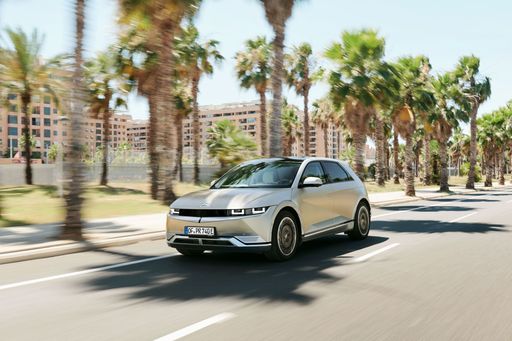 @ hyundai.news
@ hyundai.news
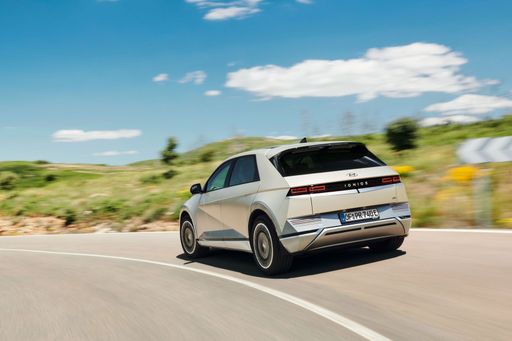 @ hyundai.news
@ hyundai.news
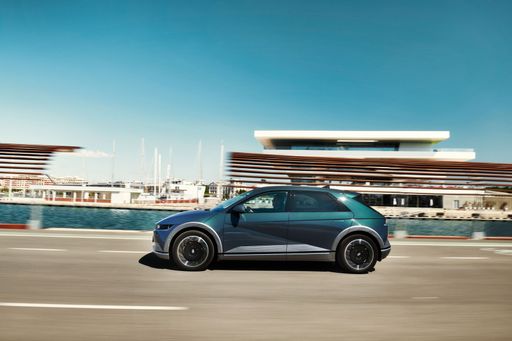 @ hyundai.news
@ hyundai.news
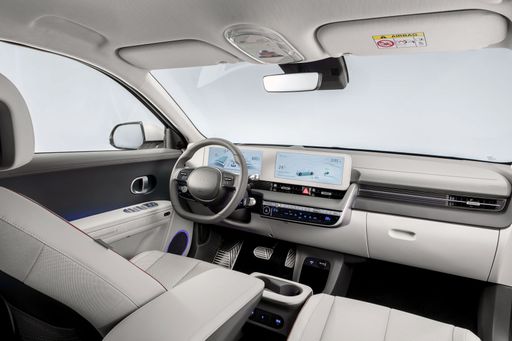 @ hyundai.news
@ hyundai.news
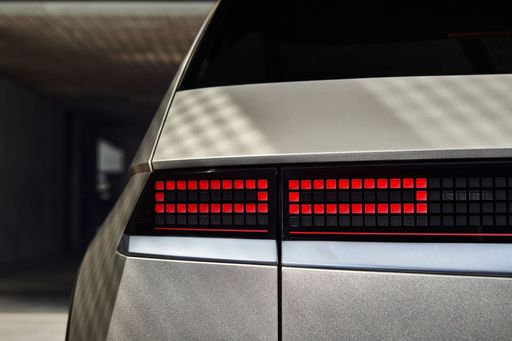 @ hyundai.news
@ hyundai.news
Toyota Yaris
The Toyota Yaris exudes a charming blend of practicality and style, making it an appealing choice for urban drivers. Its compact design allows for easy manoeuvrability in crowded city streets, while the interior offers a surprisingly spacious and comfortable environment. With a focus on fuel efficiency and reliability, the Yaris remains a popular option for those seeking a balance between performance and economy.
details @ Toyota
@ Toyota
 @ Toyota
@ Toyota

|

|
|
|
|
Costs and Consumption |
|
|---|---|
|
Price
38500 - 64200 £
|
Price
21900 - 46700 £
|
|
Consumption L/100km
-
|
Consumption L/100km
3.8 - 9.5 L
|
|
Consumption kWh/100km
15.6 - 21.2 kWh
|
Consumption kWh/100km
-
|
|
Electric Range
440 - 570 km
|
Electric Range
-
|
|
Battery Capacity
63 - 84 kWh
|
Battery Capacity
-
|
|
co2
0 g/km
|
co2
87 - 215 g/km
|
|
Fuel tank capacity
-
|
Fuel tank capacity
36 - 50 L
|
Dimensions and Body |
|
|---|---|
|
Body Type
SUV
|
Body Type
Hatchback
|
|
Seats
5
|
Seats
4 - 5
|
|
Doors
5
|
Doors
3 - 5
|
|
Curb weight
1955 - 2275 kg
|
Curb weight
1090 - 1356 kg
|
|
Trunk capacity
480 - 520 L
|
Trunk capacity
141 - 286 L
|
|
Length
4655 - 4715 mm
|
Length
3940 - 3995 mm
|
|
Width
1890 - 1940 mm
|
Width
1745 - 1805 mm
|
|
Height
1585 - 1605 mm
|
Height
1455 - 1500 mm
|
|
Payload
385 - 530 kg
|
Payload
289 - 525 kg
|
Engine and Performance |
|
|---|---|
|
Engine Type
Electric
|
Engine Type
Full Hybrid, Petrol
|
|
Transmission
Automatic
|
Transmission
Automatic, Manuel
|
|
Transmission Detail
Reduction Gearbox
|
Transmission Detail
CVT, Manual Gearbox, Automatic Gearbox
|
|
Drive Type
Rear-Wheel Drive, All-Wheel Drive
|
Drive Type
Front-Wheel Drive, All-Wheel Drive
|
|
Power HP
170 - 650 HP
|
Power HP
116 - 280 HP
|
|
Acceleration 0-100km/h
3.5 - 8.5 s
|
Acceleration 0-100km/h
5.5 - 9.7 s
|
|
Max Speed
185 - 260 km/h
|
Max Speed
175 - 230 km/h
|
|
Torque
350 - 770 Nm
|
Torque
390 Nm
|
|
Number of Cylinders
-
|
Number of Cylinders
3
|
|
Power kW
125 - 478 kW
|
Power kW
85 - 206 kW
|
|
Engine capacity
-
|
Engine capacity
1490 - 1618 cm3
|
General |
|
|---|---|
|
Model Year
2024
|
Model Year
2024 - 2025
|
|
CO2 Efficiency Class
A
|
CO2 Efficiency Class
B, G
|
|
Brand
Hyundai
|
Brand
Toyota
|
Hyundai IONIQ 5
Introducing the Hyundai IONIQ 5: A New Era in Electric Mobility
The Hyundai IONIQ 5 is a revolutionary addition to the electric car market, blending futurist aesthetics with ingenious technological features. As part of Hyundai's all-electric lineup, the IONIQ 5 exudes a refreshing approach to sustainable motoring, offering a blend of power, efficiency, and innovation that is set to transform everyday driving.
A Futuristic Design
The IONIQ 5 sets new standards in automotive design with its distinctive silhouette. Its clamshell bonnet and pixelated LED light design form a unique visual signature, evoking a sense of modernity and advancement. Built on Hyundai's Electric-Global Modular Platform (E-GMP), this SUV heralds a new direction for electric vehicles, serving both form and function with a flat floor that maximises interior space.
Performance and Efficiency
The Hyundai IONIQ 5 offers a variety of powertrains to cater to different driving preferences. Depending on the model, power output ranges from 170 PS to a staggering 609 PS, with corresponding torque between 350 Nm and 740 Nm. These configurations enable a brisk acceleration capability, reaching 0-100 km/h in as little as 3.5 seconds.
The car’s battery options of 63 kWh and 84 kWh provide flexibility between range and performance. The efficiency of the IONIQ 5 is admirable, with a consumption ranging from 15.6 to 21.2 kWh/100km, ensuring the capability to travel up to 570 km on a single charge.
Innovative Technology
The IONIQ 5 isn't just about efficient propulsion; it's laden with cutting-edge technology that enhances the driving experience. The vehicle includes an ultra-fast charging capability, able to reclaim 80% of the battery life within just 18 minutes. This is complemented by Vehicle-to-Load (V2L) technology, which turns the IONIQ 5 into a power source to charge devices or even other electric vehicles.
Comfort and Convenience
Inside, the IONIQ 5 continues to impress with a spacious and flexible cabin that maximises comfort and utility. Its minimalist dashboard, dual 12.3-inch screens for infotainment and digital instrument cluster, and extensive use of eco-friendly materials contribute to a serene driving environment.
Safety Meets Innovation
Hyundai has equipped the IONIQ 5 with an array of advanced driver assistance systems. These include features such as Smart Cruise Control, Highway Driving Assist, and Remote Smart Parking Assist, ensuring that safety is paramount without sacrificing convenience.
The Future of Sustainable Driving
With a CO2 efficiency class of A and zero emissions, the Hyundai IONIQ 5 signifies a shift towards more sustainable driving practices. Its blend of technology, performance, and aesthetic appeal positions it as a pivotal player in the electric vehicle market, paving the way for a cleaner, greener future in automotive design.
Toyota Yaris
Introducing the Next-Gen Toyota Yaris: A Blend of Innovation and Technology
The Toyota Yaris has long been lauded for its efficiency, reliability, and practicality. As we venture into the 2024 model year, Toyota has upped the ante with the latest versions of this popular hatchback, melding cutting-edge technology with eco-conscious design. Here’s an in-depth look at what makes the current Yaris line-up stand out from the crowd.
Efficient Powertrains: Hybrid and Beyond
Spearheading the technological innovation in the Yaris range is the introduction of various hybrid models. The Yaris offers a 1.5-litre full-hybrid engine, marrying a petrol engine with an electric motor to produce between 116 and 130 PS. This power blend is controlled via a sophisticated CVT-gearbox, optimizing both performance and fuel efficiency, with consumption figures ranging from an impressive 3.8 to 4.2 litres per 100 km.
For those seeking pure performance, the GR Yaris variants provide a turbocharged 1.6-litre engine capable of producing 280 PS. This power is delivered via a choice of manual or automatic transmission, giving drivers the tactile involvement or convenience they desire.
Design that Fulfils and Inspires
The Yaris hasn't forgotten its roots as a compact, city-friendly hatchback, measuring between 3,940 and 3,995 mm in length. With its bold front grille, sleek lines, and a choice of striking colours, it's a car that turns heads while remaining perfectly suited for urban environments.
The interior is equally impressive, designed with a focus on driver convenience and comfort. Depending on the variant, Yaris can offer generous cargo space of up to 286 litres, making it a perfect companion for everyday tasks or weekend escapes.
Technological Integration: The Smart Choice
Toyota's approach goes beyond just improving engine technology; the Yaris is packed with innovative features aimed at enhancing the driving experience. It boasts a suite of advanced safety systems such as lane departure alert, pre-collision system, and adaptive cruise control, ensuring peace of mind on the road.
The infotainment system in the Yaris is designed to keep you connected, offering seamless smartphone integration, a user-friendly interface, and an intuitive navigation system, ensuring that you're always informed and entertained.
The Cost of Innovation
Owning a Yaris is not just about impressive technology; it's also about making economic sense. With a price range between €25,500 and €49,990, and monthly costs spanning from €748 to €1,513, it offers a broad spectrum to suit different budget needs.
Concerned about emissions? You can rest easy knowing that the Yaris boasts a CO2 efficiency class ranging from B to G, thanks to its low emissions output of between 87 to 215 g/km.
Conclusion: The Toyota Yaris Drives the Future
The Toyota Yaris continues to be a strong contender in the compact car segment, pushing boundaries with its innovative full-hybrid systems and performance-oriented GR models. It's a remarkable blend of design, technology, and economy, ensuring it remains a top choice for drivers who demand more from their hatchbacks.
Whether you're seeking the efficiency of a hybrid or the thrill of the GR Yaris, there's a model tailored to your unique driving needs in Toyota's latest Yaris lineup.
What drive types are available for the Hyundai IONIQ 5?
The Hyundai IONIQ 5 is available as Rear-Wheel Drive or All-Wheel Drive.
The prices and data displayed are estimates based on German list prices and may vary by country. This information is not legally binding.
